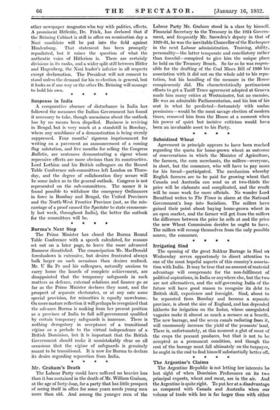Mr. Graham's Death The Labour Party could have suffered no
heavier loss than it has sustained in the death of Mr. William Graham, at the age of forty-four, for a party that has little prospect of seeing itself in office for some years needs young men more than old. And among the younger men of the
Labour Party Mr. Graham stood in a class by himself. Financial Secretary to the Treasury in the 1924 Govern- ment, and frequently Mr. Snowden's deputy in that of 1929-31, he was the inevitable Chancellor of the Exchequer in the next Labour administration. Training, ability, personality—the latter temperate and conciliatory rather than forceful—conspired to give him the unique place he held on the Treasury Bench. So far as he was respon- sible for the drafting of the Coal Mines Bill of 1930 his association with it did not on the whole add to his repu- tation, but his handling of the measure in the House conspicuously did. His characteristically pertinacious, efforts to get a Tariff Truce agreement adopted at Geneva made him many critics at Westminster, but no enemies. He was an admirable Parliamentarian, and his loss of his seat in what he predicted—fortunately with undue pessimism—would be the most savage election of modern times, removed him from the House at a moment when his power of quiet but incisive criticism would have been an invaluable asset to his Party.
* * * *


































 Previous page
Previous page